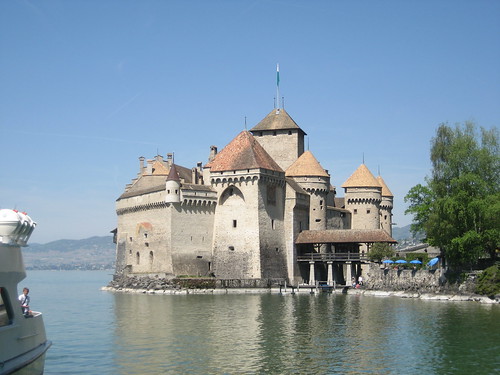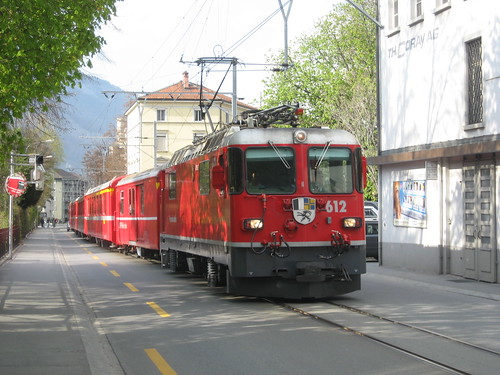Click above to see a slide show of pictures from Market Rasen
Friday 9 April – Saturday 10 AprilThe Air Canada flight from Ottawa to London was uneventful although neither Mary nor I managed to get any sleep. We arrived ten minutes early at 06.15 and Immigration and Customs were very quick. Our bags turned up in short order and we were quickly on the Heathrow Express to Paddington. This is very fast indeed – 15 minutes airport to Paddington but even so there were many interesting reminders of my past. Wharncliffe Viaduct, Southall locomotive shed, the Eurostar maintenance sheds – abandoned since the opening of St. Pancras International.
We were able to try out our Oyster cards. The underground threw a curve at us in that all Circle line trains are terminating at Edgware Road so we had an annoying climb up steps to change platforms. At least there is some good ballast and new rails now – sorely needed last time I was here.
We arrived at St. Pancras just after 07.30 and were able to validate our Brit Rail passes very quickly - not a great deal is happening early on Saturday morning and the ticket clerk is happy to chat. Mary went off to find a capucino and sandwiches. We had planned to take the 09.15 train from London to Nottingham but were in such good time that we were able to catch the 08.15, This was made up of an 125 set which must have been built in 1970s. But it rode well and the interior had recently been refurbished. The car was noisy from a group of Nottingham University students who were in high spirits. We covered 85 miles in the first hour including the station stop at Market Harborough.
The weather was warm and sunny after a foggy start. The spring flowers were coming out, especially the daffodils which grow wild in many parts. We saw a couple of male pheasants in spring plumage (bright red and green) fighting, presumably for the affections of a female who was nowhere to be seen. The spring blossoms of pink and white contrasted with the yellow of the gorse. Many farmsteads with small lambs frolicking around. The occasional canal with a few highly decorated barges and swans. Magpies, crows and lots of rabbits watching our progress from the fields.
At Nottingham we changed to a train to Lincoln Central via Newark Castle. The conductor started his announcements with:
“This is not the Skegness train, we are not going to Skeggy.”
He went through the train singing out “Any more fares please,” and his last announcement was sung as a Gregorian chant with “A-ll-ll change.” There was an hour to kill at Lincoln but there was nothing close to the station that looked appetizing so we settled for a canned beer and sandwich in the station buffet. There is now just one toilet at Lincoln station, and being on the island platform, it is the least accessible.
The train to Market Rasen was was going through to Grimsby. It was fast over straight and level track. Brian met us at Market Rasen and drove us to the Advocate Arms Hotel. The room is very pleasant indeed. It has recently been renovated and has everything we need. There is a great balcony with a view across the town – most buildings are built of a similar color brick.
We went back to Brian and Gill's and had something to eat and sat chatting in their sun lounge. They have a great variety of birds coming into their garden - chaffinches, goldfinches, great tits, blue tits, blackbirds, wood pigeons, wood doves and regular pigeons. They have a wonderful view of open country with a big accent tree in the middle distance. We returned to the Advocate Arms for a short rest and then met them for dinner in the dining room.
We had all enjoyed the Advocate Arms duck at dinner when Colin was here last time and mentioned this when making the reservation. The hotel had specially brought in duck for us and gave us a special menu as duck was not currently on the regular menu. Needless to say we all ordered the duck breast which was wonderful. Starters included confit of duck, Lincolnshire Poachers cheese souflet and goat cheese salad. Desert was Eton Mess, (broken up meringue, whipped cream and berries), chocolate souflet and three Lincolnshire cheeses.
The Search for the (not so) elusive Chip Butty


I have always regarded this as a northern specialty as it is not known in the south. It is nothing more than a french fry sandwich. Towards the end of the meal the owner heard us talking about chip butties and where you could get them around here. We asked him off the cuff if he could make one possibly tomorrow and the next thing we knew he had brought one to the table. It was very good especially as the chips were very crisp. Quite a memorable start to the trip.
Sunday 11 April



After an excellent breakfast of capucino, poached eggs, back bacon, sausage and fried bread we met Brian and Gill at the church to experience a bell ringing session. There are eight bells but they could only ring six because a couple of their number were away. They made it look easy but some of the bells are very heavy and difficult to control. There is quite a trick to get the bell up and also to get it down again into a safe position. Simon, who is also organist, called the changes and the whole experience was pretty interesting. The bellringers are mostly in their seventies and look pretty fit.



We went on a short drive to Tealby to walk around the village and have a drink at the Kings Head. There were two rallies going on, Austin Seven and Bentley, and so there was no room for us for dinner. Because of this Brian had made a reservation at Grasby. Tealby is an interesting little village but one obviously needs money to live out here. There were a lot of antique cars, most of them beautifully restored and there were a lot of antique motor bikes as well. The motor cyclists were at the Tea Rooms, the Austin Seven people were at the Kings Head and the village hall whereas the Bentley people were eating elsewhere. There is an interesting school building which looks live it had originally been a church. It even had a spire for the bell The Kings Head is very well thatched - 14th century,
We stopped st the Cross Keys at Grasby for lunch. This is set above the village on a high ridge close to the road. There are good views across the Wolds and Lincoln Cathedral can be seen on the horizon. There was a large birthday party complete with a little girl who enjoyed herself immensely and was very good indeed, although it wasn't her birthday.
The pate made an excellent starter as did the crayfish salad and wild mushrooms on toast, For main course Brian and Colin had a great slice of roast beef which tended towards tough, Mary had beetroot risotto and Gill had fish (John Dore). We stayed with beer, having had a lot of wine the previous evening. Very pleasant.
A quick stop at Barnetby to look at the surviving semaphore signals then on to a “garden centre” which sold just about everything.
At the console of the Wurlitzer organ.
Dorothy and Don invited us to their home to see and hear their collection of organs and fairground items. The highlight was the Wurlitzer which had been saved from the Granada Cinema at Slough. Simon managed to get the best out of it – especially with the Dam Busters March. The Wurlitzer is unusual in that it is an electric organ that was developed for cinemas before the advent of sound movies. Each connection is soldered and the amount of wire is phenomenal. The women doing this work were paid by the amount of wire, by weight, that they had used. Today the connections would be handled by a computer chip but this looks like an old time telephone exchange. There were two traction engines, one fully operational. Dorothy knew all the details of operation. Both were built for fairgrounds and have belt driven generators to provide power for running a fairground organ, one at 220 volts and one at 220 volts. These generators are massive and far larger than generators used on north American steam locomotives. Don and Dorothy keep all of this, including many barrel organs (but no monkeys), in a shed which they built specially at the bottom of their garden. Every so often they invite over their friends for tea and biscuits and to listen to the many organs they have. The shed has to be heated to about 55 degrees for the Wurlitzer to operate properly. The Wurlitzer organ is actually behind a partition with movable blocks to control the volume. At full blast it made the floor vibrate. Just the console is in the main area where people can see the organist. They are both passionate about their hobby and Dorothy knows as much about the details as Don. She was holding forth about the advantages of water pumps as opposed to injectors. It seem there will shortly be available a good source of Welsh coal suitable for traction engines, they are opening up one of the old Welsh collieries to produce coal for these and preserved railways. One good thing about today is that there are specialized companies who will make new parts for traction engines whereas twenty years ago it was impossible to do this. One of the engines has just received a new boiler barrel and a front tube plate. The insurance companies now do the annual inspections, for a price. The boilers both work at 250 lbs per square inch which was normal for modern steam engines. The firebox is set low in relation to the foot board. There is a deep ash pan and the fire has to be kept pretty thin and flat otherwise it will make smoke.
Back to the Aston Arms for a drink and then to bed in good time in preparation for our departure tomorrow.
Click here to see the individual pictures.




No comments:
Post a Comment